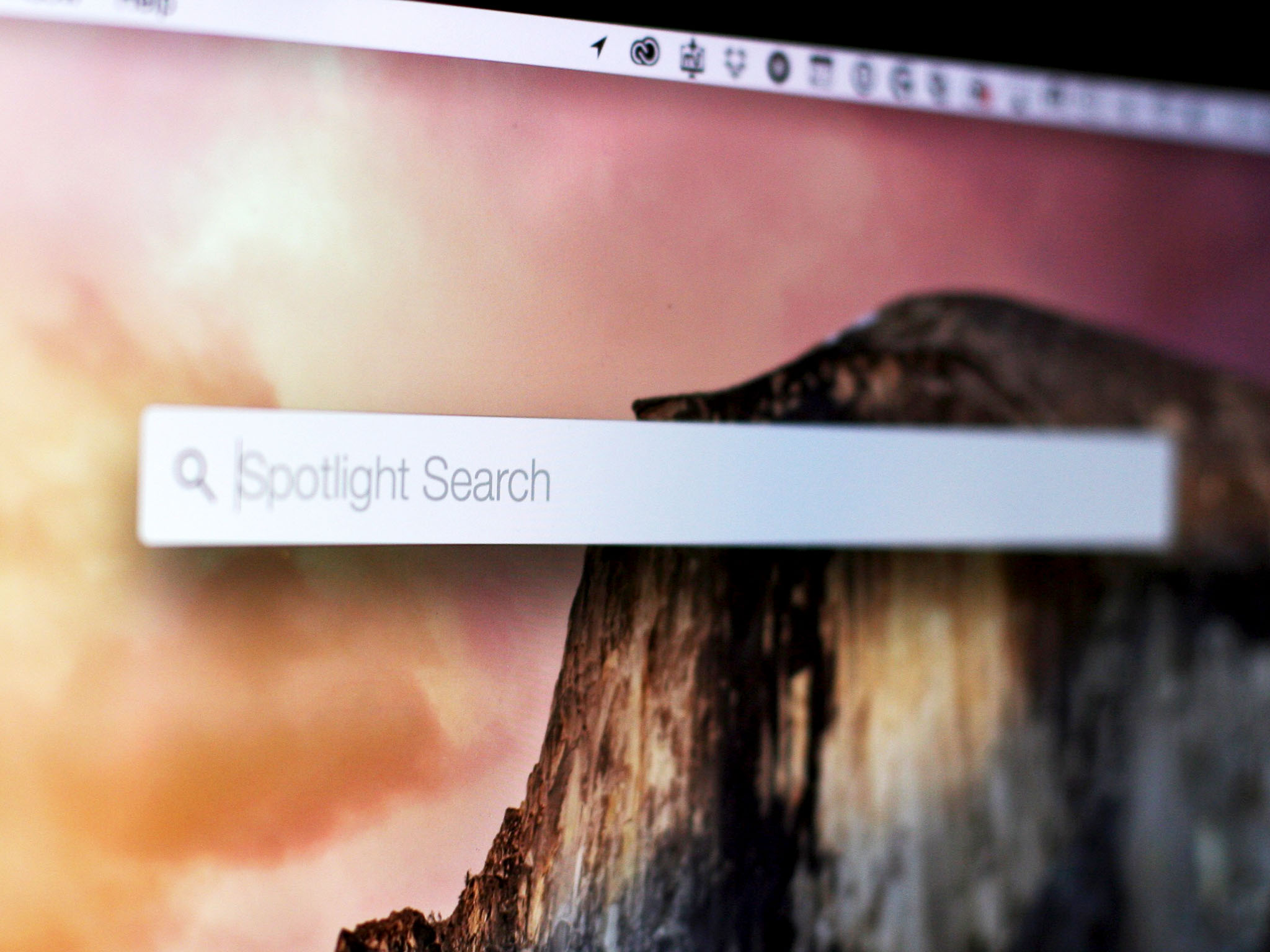OS X Yosemite review: 6 months later

First, we wrote the original gigantic review. Then, we got together and chatted about the operating system three months later. Now, six months after the release of OS X 10.10, the iMore team is back at it to talk once more about Apple's national-park-named operating system.
Design

Ren: The more I work with OS X Yosemite, the more I love its design and aesthetic. It flows really seamlessly when you're switching between iOS and OS X, and I love the new Safari window more every day. I only wish I had a Retina computer to really take advantage of the new design.

Ally: Yosemite fuses iOS and OS X together for the first time. Design language is important and it's one of the very first things people notice. Anyone already using an iPhone or iPad will now be instantly familiar with a lot of the same aesthetic features on the Mac, thanks to Yosemite. It makes the switch from PC even more enticing, and that wasn't on accident.

Peter: It didn't take me long to get used to the visual changes to Yosemite, producing more consistency with iOS 7 and 8. It's also Retina-optimized, which means it doesn't look quite as nice on the MacBook Air and older Macs. I must say it looks especially nice on the new MacBook.

Rene: Yosemite is the first version of OS X for me where it's almost painful to go back to an older version based on looks alone. I mentioned during the 3 month later review that, unlike previous generations where I've waiting a year or so to upgrade my podcast studio Mac, the new interface had me upgrading almost immediately. It's clean, it's crisp, and it's deep. I like it so much I'm even more interested in seeing how, if at all, Apple will tweak it for OS X 10.11 this year.
Extensibility

Ally: This is one area I'd really like to see developers do more with. On iOS I can create workflows through extensions, add deliveries, view source code, unzip files, and do tons of other neat things. Sadly, a lot of that same love hasn't yet been given to the Mac. The app that have implemented it have made my life even easier. But whenever I try and use a share or action extension that isn't available in OS X that is on OS X, it makes my heart sad.
Here's to hoping developers will continue to try and find even more unique and useful ways to take advantage of extensions on OS X, because we aren't quite there yet.
iMore offers spot-on advice and guidance from our team of experts, with decades of Apple device experience to lean on. Learn more with iMore!

Peter: Still not as much of a feature smorgasbord as I would like to see, though where it's been applied has made my worfklow a lot more seamless.

Ren: I use Extensibility all the time on my iPhone and iPad, but rarely on my Mac. The same library for sharing extensions just doesn't exist on OS X yet, though I hope developers address that this year.

Rene: We're going to look back and see extensibility as one of the biggest changes in computing technology in recent years if not decades. Decoupling interface and unbundling apps so that functionality no longer has to be hunted down but can be pushed up is fundamentally transformative. I agree with my colleagues, however, that right now it's far more impactful on iOS than it is on OS X. The combination of Touch ID and action extension on iOS, for example, makes 1Password a better experience now on the iPhone or iPad than the Mac.
Perhaps that's because OS X has always been a less controlled, more functional environment, or perhaps it's because developers have better engaged with extensibility on iOS than OS X. Time will tell.
Continuity

Ally: I use Continuity constantly, whether it be for calling or messaging. I've said it many times and I'll say it again, if you own a non-iOS phone, we can be friends again my green bubble freak friends. Before, it just broke up my workflow too much to stop what I was doing and respond to a regular text message. With Continuity, I don't have to. I'm not quite sure what people without a built-in messaging solution do, and yes, I'm looking at all the PC people in the room. And then there's apps like Pixelmator that let me pass what I'm doing off from my iPhone or iPad to my Mac, and vice versa. I've become completely spoiled by it.
If I'm at my Mac, I almost never pick up my iPhone or iPad any more, because I don't have to, thanks to Continuity.

Ren: I go back and forth on Continuity being my favorite thing or just something I happen to use on occasion. Handoff still isn't (for me, at least) regularly reliable enough for me to always use it; if I expect an app to be ready to hand off in my Dock and it's not there, it breaks the experience. SMS Relay is excellent, however.

Rene: I'm using Continuity more now than I was previously. I'm still not answering my phone on my Mac regularly, like Peter, but I am using Handoff to sling everything from half-composed mail and messages around to half-read webpages. (Though I wish webpages could push scroll position reliably as well.) Instant hot spot is my constant coffee shop companion and during the transition period from My Photo Stream to iCloud Photo Library, Air Drop was a life saver for screenshots. Now we just need some hot Continuity for iTunes action and things will get even more interesting.

Peter: Continuity is my most used Yosemite feature. I don't even think twice about using my iPhone as a hotspot or a relay to my "green bubble friends" from my Mac. It works like magic. It hasn't always. But it's getting more solid with each successive built of OS X and iOS 8.
Spotlight

Ren: Launchers forever! I use Spotlight early and often, and the Flashlight plugin has essentially let me turn it into a full-fledged launchbar utility. It's great. I do wish you could move the Spotlight search bar to another location, though — sometimes I'll be doing calculations and the Spotlight bar drops over whatever I was referencing, which is a pain.

Ally: I use Spotlight like I always have and it's one area that I don't think I use to its full advantages. I never look up Wikipedia info or search the web, mainly because I'm so used to launching a browser. Muscle memory right there.
I do use Spotlight often to convert currency though. Seriously, awesome feature. Try it.

Peter: Spotlight is, arguably, my main user interface element for doing almost everything. I usually don't go clicking around windows or relying on third-party menu bar apps or interface enhancements; just hit command-spacebar to bring up the Spotlight window, type my search query, the name of the app I'm looking for, movie times, unit conversions and more. Spotlight is easier to work with than ever in Yosemite thanks to extended data searching, which you can customize in System Preferences.

Rene: I'm with Peter. Spotlight is how I find almost everything on my Mac. The new Spotlight has a few new features that I like and use occasionally, but 6 months in I'm still primarily using it the way I always have — to launch apps and find files.

Ren: Mail continues to be more reliable than Mavericks, but still not as rock solid as Snow Leopard. Messages move to the folder I'm asking them to about 90 percent of the time — which overall is a pretty good record — but I'd still like to not doubt that when I do something in Mail, I may have to come back and do it again.

Ally: I don't use the built-in Mail app and haven't in years. I toggle regularly between Mailbox and Airmail 2 which I find to be way superior. At least enough for me to forego Handoff in order to use them.

Rene: I'm the anti-Ally. I use Mail both for my personal accounts and for my work account, and I still like the way it's set up and implemented better than third party alternatives. I wish I could get Gmail over Exchange the way I can on iOS, and I wish I didn't have to kill and restart it on occasion to get Gmail to update — and had a clue whether that was Mail or Google's quirky IMAP implementations — but the good far outweighs the bad.
I haven't found myself using Markup, however. When I annotate, I still do so in Napkin and then send by Mail.

Peter: I know Mail's been troublesome for some users, but I haven't run into any issues with it in a while. I manage a variety of different accounts with it too, including iCloud, Gmail and more.
Safari

Ally: Yosemite is the first time I've actually used Safari more than I do Chrome. I love the fact that previously clicked links on my iPhone or iPad also translate to my Mac, and vice versa. Features like iCloud Tabs, universal search history, and anything else that meshes my workflow together keep making Safari more and more appealing to me.
Fine Apple, you finally got me to use Safari full time. Happy?

Rene: When Yosemite launched there was a JavaScriptCore crash that would kill especially JavaScript heavy websites — including, iMore, alas. That was fixed a version or two ago, and everything has been fast and solid for me ever since. If I ever have to play a Flash video — looking at you TV channel embeds! — or open a Google Doc, I do so within a Chrome jail. For everything else, Safari's sleeker interface and ability to sync everything I've done on iOS just makes it such a better experience for me.

Ren: Hallelujah to fixing that JavaScript bug — it made Safari nigh-unsable for me for awhile. But now it's fixed, and I can enjoy the real delight of Apple's web browser on OS X Yosemite: its speed and cleanliness. Safari has always been quick, but it feels even lighter and faster in this version of OS X; I'm a huge fan of its minimalist design, as well. Though I tend to keep all the extra bells and whistles — tabs, the status bar, bookmarks — turned on, Safari never feels cluttered, guiding the majority of your attention to the website you're visiting.

Peter: Continuity's handoff of Safari web pages you already have open on another device, as Ally described, is a very cool reason to use it. It also does a much better job managing system resources than either Firefox or Chrome, which makes Safari a better choice for Mac laptop users who work untethered.
Photos

Rene: With Photos Apple has delivered on what I've always wanted: ubiquitous nearline picture and video storage. It's new and there are still some features missing that I'd like, but the core idea is solid and that's the most important thing for me. Any picture or video I take or save on my iPhone or iPad, or take, save, or import on my Mac, all just goes up into iCloud Photo Library, and the more recent, more frequently accessed, and most favorite get cached locally on all my devices.
Yes, the price plans are still expensive, especially when compared to the ad or data collection subsidized models of competitors, but I like the privacy and I like the architecture. Photos for OS X and I are going to be fast friends.

Ren: I've been using the Photos app with the OS X 10.10.3 beta for awhile now, but I am so happy it's finally hit the public stage. While not Aperture, the Photos app is an excellent all-purpose tool for image management and editing, and iCloud Photo Library makes it even better. I do have my gripes and wish lists, but overall, it's a great first step from the company.

Ally: All my photos completely in sync, across all my devices? Including albums? Yes please! It's something I've been wanting for entirely too long. It also forces me to better organize my crap, which isn't a bad thing. Aside from a few glitches and bumps in the road, I'm completely happy with Photos as an organization tool. For anything else, I still have Lightroom.

Peter: Photos had a mostly successful product launch with the release of 10.10.3; I think this is due in part to a lot of pre-release testing with OS X developers. Not everything is seamless in Photos, but integration with iCloud photo services is infinitely better.
Messages

Ally: Yeah, Continuity and Messages are pretty much the bees knees. I am not quite sure how I lived without them in my prior lives. Seriously. How did I?
Oh and being able to mute Rene's weird Star Wars references at midnight that I won't understand anyways? Priceless!

Peter: Messaging improvements in Yosemite have run hot and cold. Group messaging is something that we at iMore use every day to stay in touch with each other, while Soundbites — adding audio recordings to your Messages — isn't something that I use or that many other people I've checked with use either. The ability to mute conversations and to leave them all together was long overdue.

Ren: Messages by and large works very well for me on OS X Yosemite, but like Peter, I wish that group messaging was implemented more successfully. For every seamless SMS relay, I also have multiple group threads and general disorganization. I could also do with a smarter, faster search bar.

Rene: Star Wars is Harry Potter in space, Ally, except with cleaner, more self-actualized archetypes! That aside, I love messages on OS X. It's fast, it's fluid, and it's insanely productive. The only catch is occasional weird behavior like Peter mentioned. Not only the group messages splitting, which is apparently being fixed, but also the sometimes delay in populating messages after startup.
Also, because there are no instant selfie, video, or location senders, I find it less stressful overall than Messages for iOS where I'm one misclick away from accidental oversharing.
Cross-device messaging is a tough problem to crack, but that's Apple's job.
Bottom line

Ally: OS X Yosemite and iOS 8 tie together the entire Apple ecosystem in a way that was previously inconceivable. iOS owners that are new to Mac will instantly feel a warm familiarity, and that makes things a lot less scary.
However, Apple still wants a Mac to be a Mac and an iPhone to be an iPhone. They just want them to work together better, and they've succeeded.

Rene: Six months later Yosemite is the best version of OS X I've ever used. Sure, there are bugs and people are right to complain. Everything from Extensibility to Continuity to everything that drives them, like the discoverd daemon, were massive changes and brought with them some of the instability you get when massive changes are made. It's happened before — humans forget old pain while new pain burns sharply — and it'll likely happen again. It got everything in place from cross-device functionality, however, including Apple Watch, and it set Apple and us up for the next stage of computing.
Like everyone, I want the bugs fixed and fixed fast, but I also want Apple to continue to bring us the future faster.

Ren: OS X Yosemite gets better with every point release and bug fix. It packed some big changes into OS X, and carried them off largely without a hitch. There are snags here and there, but it seems like Apple is committed to fixing the holes and making its operating system even smoother and more solid as time goes on.

Peter: Apple understands that Macs and iOS devices are used for different reasons and have different strengths and weaknesses. There's no need to unify the user interface between mobile and desktop as Microsoft has tried to do with Windows. The benefit is in the unification of workthrough with technology like Continuity.
I hope the next year is more "rebuilding" year than year rife with more customer-facing features; I'd like to see Apple get obsessive in making sure this new tech works as solidly and seamlessly as it can before doing anything else.
Serenity was formerly the Managing Editor at iMore, and now works for Apple. She's been talking, writing about, and tinkering with Apple products since she was old enough to double-click. In her spare time, she sketches, sings, and in her secret superhero life, plays roller derby. Follow her on Twitter @settern.

